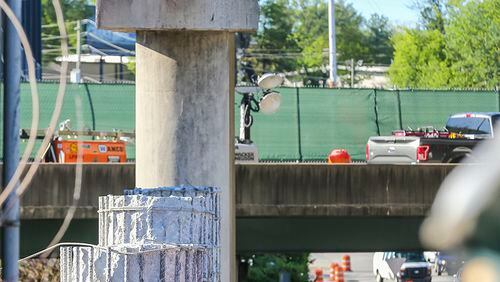This fiasco on Interstate 85 has been a giant headache for metro Atlanta.
But we’ve been persevering, and government officials are promising to get the bridge replaced in record time to get our traffic back to the normal — at least what we consider normal for plodding Atlanta commutes.
In fact, the contractor rebuilding the I-85 bridge could earn up to $3.1 million extra for finishing the project early.
As reported by the AJC's David Wickert, Georgia Department of Transportation Commissioner Russell McMurry said everything would have to go right — including the weather — for the contractor to earn the full incentive. But he said the incentive package shows the state is "very serious about getting this road back open so people can get on with their lives."
That’s welcome news for our immediate future. But our community has had little time to think about the big picture.
The bridge can be fixed, but what about Atlanta’s reputation? It may be too late to salvage that, and it’s worth understanding what can happen to a city when its blunders enter the nation’s consciousness. And Atlanta’s numerous recent transportation problems certainly have.
After all, have you talked to anyone from outside the area who hasn’t asked you about it?
For a case in point, just look to my hometown of Cleveland, Ohio. For nearly 50 years, that city has tried to shed reputation after an odd fire (sound familiar?), one that stuck it with a reputation it couldn’t get rid of.
The Cuyahoga River, which snakes through that part of Ohio and eventually empties into Lake Erie, had for decades served as the thoroughfare of industrial progress for Cleveland.
As a city that rose during the nation’s industrial age, the Cleveland river’s banks were home to steel mills, oil refineries and paint manufacturers. Many of those young companies became iconic American brands, including at least one you’ve heard of.
A young bookkeeper from Cleveland got interested in the oil business, and he built a refinery along the Cuyahoga. His company became Standard Oil. His name was John D. Rockefeller.
As smokestacks belched into the skies and refineries dumped waste into the Cuyahoga, the city took pride in its industrial might.
But then fate intervened.
On June 22, 1969, a rail car carried molten steel across the river near downtown on the Norfolk and Western railroad bridge. Sparks from the car landed in the river, ignited the oil and debris floating on its surface.
The river caught fire. And Cleveland became known as a town with waterways so polluted that they burned.
The city, which had called itself “The Best Location in the Nation,” became “The Mistake by the Lake,” a reference to Lake Erie, itself among the most polluted bodies of water in the country at the time.
And I know what you’re thinking. The comparison isn’t entirely accurate, or fair. And you’re right. At that time, Cleveland was already struggling with economic woes, white flight and other complex issues.
But it’s important to know that at the time, it also wasn’t unusual for rivers to catch fire. It happened routinely in Cleveland and other industrial cities, including Baltimore, Detroit, Buffalo and Philadelphia, according to The Washington Post.
Cleveland’s river had ignited at least 13 times before. The local media hardly covered the 1969 fire, and no picture of it apparently exists. That’s how insignificant it seemed to the town itself.
But then Time magazine decided to highlight it, and actually used a photo of an earlier fire on the Cuyahoga.
So Cleveland’s river had many fires, but just one important one. Just like Atlanta’s had numerous transportation fiascos, small and large. Was this the one that will establish our national reputation?
In 1969, Cleveland’s river fire captured the nation’s imagination as the environment became a national concern. The first Earth Day would be celebrated less than a year later.
So now Atlanta has potentially positioned itself as the poster child for a nation concerned with the future of transportation.
How troubling would it be for our city, founded as a transportation hub, with the world's leading airport, to be known as the nation's best example of a dysfunctional transportation system? Of what not to do?
And that traffic jam caused by the foam Braves tomahawks last week on I-75 in Cobb County just contributes to the image — and provides a good laugh for the rest of the country.
Perhaps the I-85 bridge collapse will become the moment when metro Atlanta finally took on its transportation problems. This can be a time for thoughtful solutions, for leaders to say: “We can’t let this happen again.”
One bridge, in one spot, bringing the metro area to its knees? How can we let that happen?
Atlanta should be known as a city leading in transportation solutions. We may be a city too busy to hate, but perhaps that’s because we can’t get anywhere on time.
Last summer, a lot of Georgians visited Cleveland for the Republican National Convention. Each one I talked to enjoyed the city. Many said it was much nicer, cleaner and impressive than they imagined — given its reputation.
They were genuinely surprised.
Atlanta needs to get busy, and surprise the country with its transportation solutions and vision. Before it’s too late.
For online: http://www.ajc.com/news/traffic/what-you-need-know-find-marta-station-parking-spot/jhYA9h0gERwRvegxaqIIbO/
Bridge Collapse: Here’s what we know, two weeks later
http://www.ajc.com/news/local/things-know-about-the-bridge-collapse-two-weeks-later/Wge6pwVF4kPJx6J0TuaTHL/







